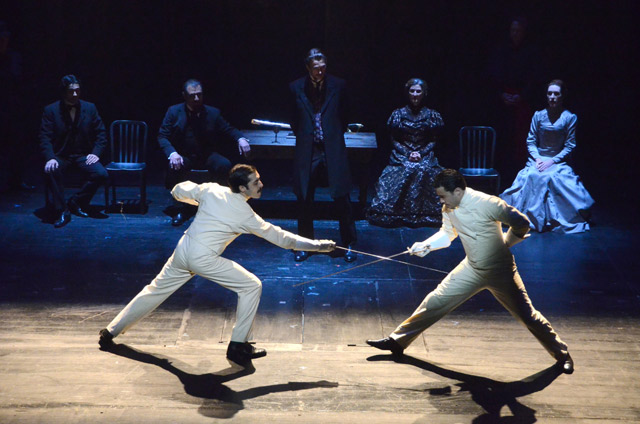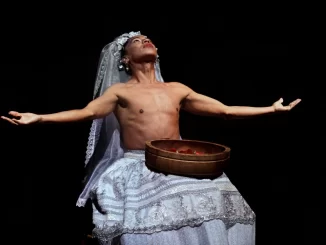Hamlet, Prince of Cuba at the South Miami Cultural Miami-Dade Cultural Arts Center
 When it comes to Shakespeare’s Hamlet, productions and adaptations abound, but Michael Donald Edwards, Artistic Director of Sarasota’s Asolo Repertory Theatre has the distinction of creating the first Cuban Hamlet. Edwards’ adaptation made its Miami debut with English and Spanish productions the second weekend of May at the South Miami-Dade Cultural Arts Center in Cutler Bay.
When it comes to Shakespeare’s Hamlet, productions and adaptations abound, but Michael Donald Edwards, Artistic Director of Sarasota’s Asolo Repertory Theatre has the distinction of creating the first Cuban Hamlet. Edwards’ adaptation made its Miami debut with English and Spanish productions the second weekend of May at the South Miami-Dade Cultural Arts Center in Cutler Bay.
Hamlet, El Príncipe de Cuba (Hamlet, Prince of Cuba) debuted on Friday, May 11 directed by Edwards and featuring Frankie J. Alvarez as Hamlet. Pulitzer Prize-winning playwright, Nilo Cruz has rendered a lively Spanish-language translation of Edwards’ adaptation. Cruz’s adheres to the taut muscularity of Shakespeare’s language without falling into what could be a quagmire of tropes. Asolo Rep’s Hamlet has the further distinction of working with a bilingual cast. All of the cast, except for Raul Duran and Gonzalo Madurga, are featured in the English and Spanish productions.
Edwards astutely directs Alvarez who laudably plays the prince who must wrestle with life’s big questions amidst debilitating depression and an unbound desire for revenge. An agile and resourceful actor, Alvarez brings humor and playfulness to the role without sacrificing depth of character. The director’s decision for Hamlet to move throughout the theater is innovative and engaging. At one point, he hops off stage and sits next to an audience member, resting his head on her shoulder. This movement works against the potential pitfall of performing Shakespeare in long, static monologues. Furthermore, it makes the audience aware of the play within a play and Hamlet is a play that is as much about the theater as it is betrayal.
Costume designer, Clint Ramos and set designer Dane Laffrey create an atmosphere of colonial Cuba with modern accents. The sets and costumes seem deliberately ambivalent. Perhaps this is appropriate since the script makes no direct references to Cuba. This leads to the question how Cuban is Hamlet, Prince of Cuba? Certainly it’s more notable in the Spanish-language version that Hamlet, Ofelia, and most of the cast do not speak Spanish with a Cuban accent or cadence. Non-Cubans can certainly portray Cubans; however, since the play is not Cuban in its substance, it feels like a missed opportunity. Hamlet, Prince of Cuba could be taking place in San Juan, Puerto Rico, Cartagena, Colombia, or any number of Caribbean or Latin American cities.
There are moments, however, where Edwards’ vision and the Bard’s masterpiece unite in a unique display of Shakespearean Cubanidad. The first is when Hamlet sees his father’s ghost via an afro-Cuban priest’s (Gonzalo Madurga) ritual. The seizures and electronically altered voice that appear later to signify that Hamlet is being possessed by his father are way over the top; however, the original concept is exceptional.
Another such moment is when Raul Duran, the gravedigger, sings and jokes at the grave of Ofelia. Duran brings a feisty wit to the scene that feels distinctively Cuban. More moments like these would help bring to fruition the ingenuous idea behind this adaptation.


Be the first to comment